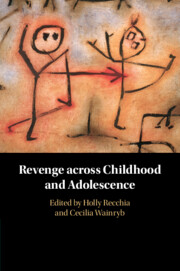Book contents
- Revenge across Childhood and Adolescence
- Revenge across Childhood and Adolescence
- Copyright page
- Dedication
- Contents
- Figures
- Tables
- Contributors
- Acknowledgments
- Chapter 1 And If You Wrong Us, Shall We Not Revenge?
- Chapter 2 A Framework for Understanding Variation in Youth Revenge Motivations and Retaliatory Behaviors
- Chapter 3 Normative Changes and Individual Differences in Retaliation Judgments
- Chapter 4 Developing Revenge in Early Childhood
- Chapter 5 Understanding Youths’ Retaliatory Experiences through the Lens of Moral Agency
- Chapter 6 Cultural Systems and the Development of Norms Governing Revenge and Retribution
- Chapter 7 Settling the Score in a Zero-Sum Game
- Chapter 8 Intergroup Processes
- Chapter 9 Revenge, Justice Systems, and Institutional Trust in Schools
- Chapter 10 The Importance of a Positive School Climate in Addressing Youth Retaliation
- Chapter 11 Socioemotional Competencies and Positive Classroom Climate as Alternatives to Prevent Revenge in Colombian Schools
- Chapter 12 Looking Back and Charting a Course
- Index
- References
Chapter 3 - Normative Changes and Individual Differences in Retaliation Judgments
A Constructivist Developmental Perspective
Published online by Cambridge University Press: 08 July 2021
- Revenge across Childhood and Adolescence
- Revenge across Childhood and Adolescence
- Copyright page
- Dedication
- Contents
- Figures
- Tables
- Contributors
- Acknowledgments
- Chapter 1 And If You Wrong Us, Shall We Not Revenge?
- Chapter 2 A Framework for Understanding Variation in Youth Revenge Motivations and Retaliatory Behaviors
- Chapter 3 Normative Changes and Individual Differences in Retaliation Judgments
- Chapter 4 Developing Revenge in Early Childhood
- Chapter 5 Understanding Youths’ Retaliatory Experiences through the Lens of Moral Agency
- Chapter 6 Cultural Systems and the Development of Norms Governing Revenge and Retribution
- Chapter 7 Settling the Score in a Zero-Sum Game
- Chapter 8 Intergroup Processes
- Chapter 9 Revenge, Justice Systems, and Institutional Trust in Schools
- Chapter 10 The Importance of a Positive School Climate in Addressing Youth Retaliation
- Chapter 11 Socioemotional Competencies and Positive Classroom Climate as Alternatives to Prevent Revenge in Colombian Schools
- Chapter 12 Looking Back and Charting a Course
- Index
- References
Summary
This chapter addresses several central issues in the study of revenge during childhood and adolescence, focusing specifically on moral evaluations of retaliation and retributive justice. We begin by distinguishing among relevant concepts and consider their respective moral status by discussing their moral-philosophical foundations. Next, we summarize and critique classic developmental psychology research on children’s reasoning about retaliation, focusing on Piaget’s (1932) early work but also addressing Kohlberg’s (1981) account when appropriate. This is followed by a discussion of social-cognitive domain theory (SCDT), a constructivist developmental perspective that we assert is better able than earlier psychological approaches to address the ambiguities of provocation, retaliation, and revenge. Consistent with recent trends in SCDT research, we also consider individual differences in children’s evaluations and responses to provocation, focusing on research investigating the social and psychological correlates of retaliatory aggression. Finally, the chapter concludes with a review of key findings and suggestions for future research.
Keywords
- Type
- Chapter
- Information
- Revenge across Childhood and Adolescence , pp. 37 - 75Publisher: Cambridge University PressPrint publication year: 2021
References
- 2
- Cited by

